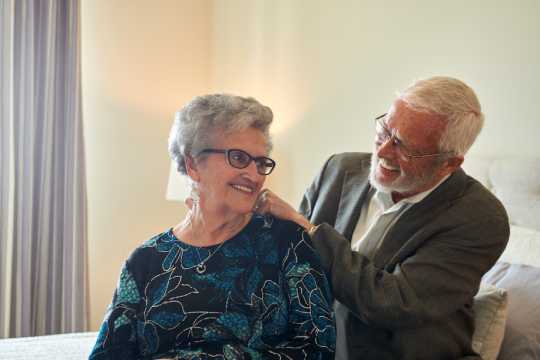
A dementia diagnosis will change the relationship you have with your partner. Seniors who become the caregiver for a partner with dementia face many challenges and will have to adapt to the realities of caregiving.
One of these struggles is mental health. Caregivers face tremendous pressure, both mentally and physically as dementia advances in a partner. Many caregivers feel the need to always make sacrifices for their partner, but taking care of your own health will put you in a better position to provide your loved one with quality care. There are some steps you can take to help you cope with the stress and better support a spouse who has been diagnosed with dementia.
#1 Discuss Your Plan for the Future
When you or your partner is first diagnosed, it’s important to come up with a plan. Now is the time to make important decisions, while your partner can discuss them. The onset of more advanced dementia symptoms is different for everyone and may depend on the type of care they’re receiving. As those symptoms worsen, it helps when you already know what to do next and what your partner desires.
Some of the most important decisions to make now will be financial and legal, as well as long-term care planning. There are living options that can work for both partners. At All Seniors Care Living Centres, buildings are host to both independent seniors and those who required assisted living. A retirement residence is an option that can alleviate a great deal of stress. Buildings such as our Cité Parkway seniors residence offer the kind of flexible care that makes this possible.
#2 Adapt Your Relationship to New Challenges
Your relationship is going to change as dementia advances and this can be a source of frustration for both of you. Dementia does not change the need for love and affection, and you and your partner may need to find different ways to communicate your feelings. Find a way to stay emotionally connected and adapt your relationship to new challenges.
#3 Help Your Partner Maintain their Independence
You can help by providing memory cues to help your partner remember things like appointments, taking medication, or recalling names and situations. Rather than handing them the answers, often a jog is all it takes for them to remember on their own.
#4 Help Your Partner Live a Quality Life
Staying physically active and eating nutritious meals go a long way toward a quality life, as well as social activities and activities that that are mentally stimulating.
#5 Pay Attention to Your Own Care
Self care is an important element when you become a caregiver to a spouse with dementia. The Alzheimer Society of Canada has developed a caregiver stress test to help you determine if you are at risk for burn out. Burn out is not something you can fix by taking a day (or even a week) off. It can take years to fully recover from burnout, which means prevention is often the best medicine. Rely on friends, family, or professional support to avoid caregiver burnout.
Moving into a retirement residence with your partner may help you get the support you need. You may want to get in touch to learn more about All Seniors Care and how our residences provide a smooth transition from independent to assisted living. We value aging in place by providing flexible care.